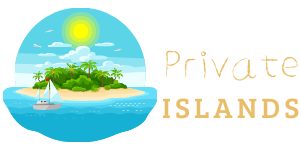Private Island Living
For those who have the means and the desire, buying and living on a private island is a dream many find irresistible. Islands, whether large or small, tropical or temperate, far away or just a short boat ride from a city, offer an escape into a world of solitude and seclusion. Whether a home on the shore or a fully equipped luxury resort, these isles are a paradise all to yourself.
As leisure travel continues to lag in the wake of Covid-19, real estate brokers and upscale travel advisories are seeing increased interest in private island properties. Chris Krolow, a real-estate broker who runs the online marketplace Private Islands Inc and hosts the HGTV show “Island Hunters,” says that he now receives 150 inquiries per day, up from a typical 100 before the pandemic. Those looking to purchase are interested primarily in islands that are accessible during the current pandemic, including in the Caribbean and Central America. Krolow says that his own private island, Gladden in Belize’s Barrier Reef, has seen a spike in bookings for the rest of this year.
But what is life like on a private island? Does owning a piece of paradise really pay off?
A lot of people who buy and live on private islands are doing so for the simple pleasures. They like to host friends and family at their beachfront retreats, eat fresh seafood and enjoy the sunsets over calm seas. Others are pursuing more spiritual reasons to purchase and live on an island, such as to gain a deeper connection with nature and to disconnect from the noise of modern life.
Most of these buyers are coming from the United States and Canada, says Misty Belles, head of global public relations for Virtuoso, an upscale travel network that has $30 billion in sales. Jack Ezon, founder of New York-based Embark Beyond Travel, says his firm is seeing more private island rental requests and confirmed bookings, too. He adds that clients are largely interested in places that are sheltered from the winds that whip up during the summer, such as the Bahamas and Jamaica.
It’s also important to note that, even if an island is privately owned, its laws are determined by the country in which it’s located. And the rules of any new government cannot be made up by a private owner, as it would be against international law.
Having a private island can be a rewarding experience, but it’s not for everyone. So before making the leap, aspiring island owners should carefully weigh the pros and cons.
